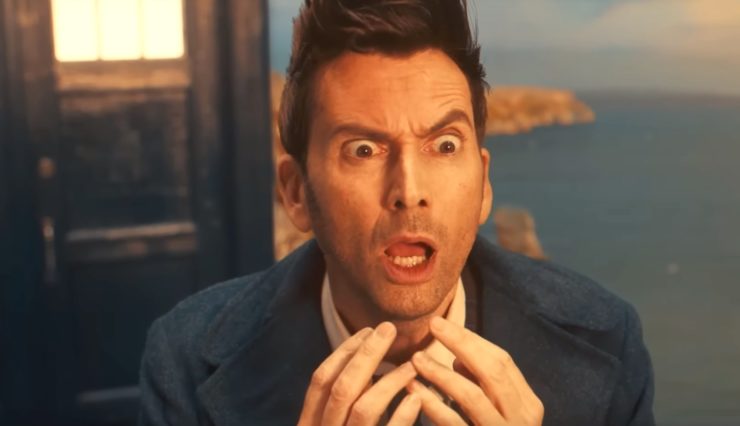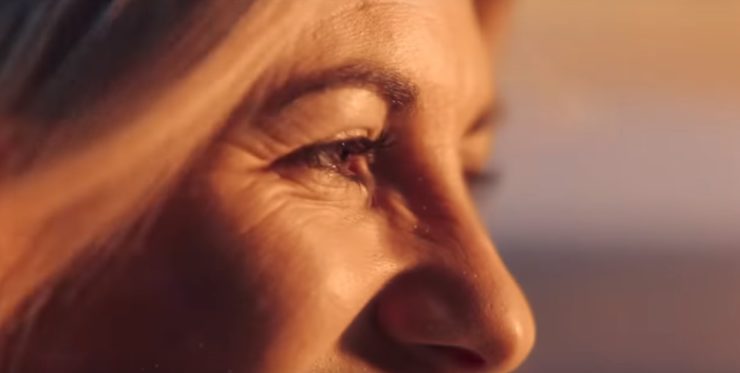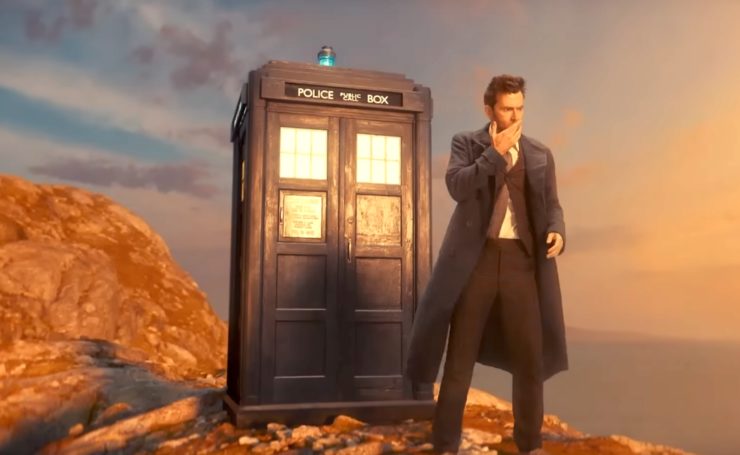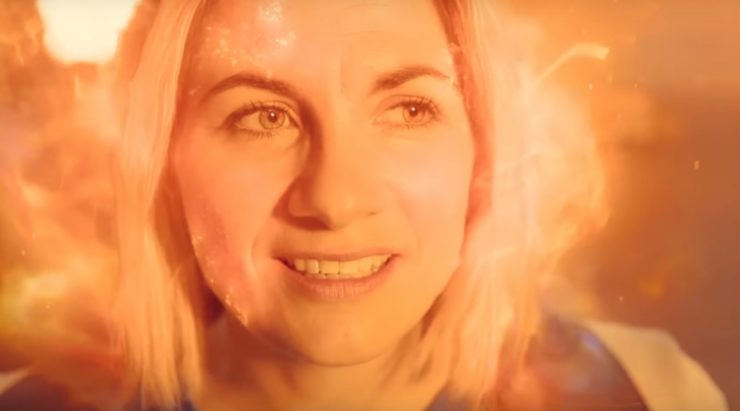This is… the third Doctor I’ve said goodbye to in my time on this site. It doesn’t get easier, which feels little silly to say over a regenerating fictional character, but if you’re here, you know. And this is Thirteen we’re talking about. She’s special. Letting her go was never going to be an exciting prospect.
Recap
The Doctor, Yaz, and Dan are trying to save a hijacked space train from the CyberMasters, who are trying to nab the train’s cargo. They stop the train, but fail to save the cargo, which appears to be a little girl, and in that process, Dan almost dies. They land on Earth to refuel and regroup, and Dan tells the Doctor that he’s had a great time, but needs to get back to his life. As he’s saying goodbye to Yaz outside, the Doctor gets a message from a rogue Dalek, who believes that their kind has lost the right to exist. It wants the Doctor to meet with it so it can tell her about the Dalek’s current Earth invasion plan. She’s skeptical, but curious all the same, and she’s also spotted a strange anomaly in 1916, a new moon orbiting Earth. Once Yaz is on board, they get a call from Kate Stewart, who demands that they head to UNIT immediately. The Doctor finds that former companions Ace and Tegan Jovanka are working with UNIT, and they awkwardly reunite.
At UNIT HQ, they find out that famous paintings have been stolen and the world’s leading seismologists have been too. The paintings were all defaced with the Master’s image, and a message from him quickly pops up—he’s having a meeting to discuss his current plans. The Doctor and Yaz head over and find that he’s shrunken all the seismologists and plans to erase the Doctor from existence. UNIT takes him into custody, which he seems very okay with. Tegan and Ace are both less than pleased to see him again, but he’s brought a basement holding cell. It turns out that he’s in league with both the CyberMasters and the Daleks. The extra moon in 1916 is a cyber-conversion center being powered by a Qurunx, the cargo that was kidnapped from the train. Qurunx’s are beings of incredible energy that can create life anywhere on a massive scale, and it’s being used to power the moon. The Dalek part of the plan will set off all of Earth’s volcanoes in the present, destroying the planet.
The Master reveals that he cloned Ashad and that the little Cyberman doll Tegan thought she received from the Doctor was actually from him; it embiggens and releases a cyber army who quickly take over UNIT and release him. The Daleks capture the Doctor (her Dalek contact was legitimate, but didn’t know it was being monitored), and send her to the Master in 1916, where he uses the Qurunx to power a forced regeneration, making her to regenerate into him. Now that he’s “the Doctor,” he demands that Yaz be his companion and watch as he destroys the Doctor’s reputation. But Yaz knows enough about the TARDIS to fly it, and she abandons him after getting a distress call from Vinder, who has crashed on the second moon. Yaz learns that the Doctor planted holographic interfaces in herself, Tegan, and Ace (why she kept static shocking everyone) made up of her personality, and it offers the three of them help in their missions—thought in Ace and Tegan’s cases, it morphs into the versions of the Doctor that they traveled with.
Ace heads to the volcano where the Daleks were working to stop them with her latest version of Nitro 9, and runs into Graham; they quickly hit it off and start working together. Tegan stops the Cybermen at UNIT with a little tech help, preventing the deletion of Kate Stewart. The Doctor finds herself in a mental netherworld where a few previous incarnations—Five, Six, Seven, and Eight specifically—tell her she’s not done and cannot let the Master take over their life. Yaz and Vinder head back to pick up the Master and bring him back to 1916 to kill the CyberMasters and reverse the forced regeneration. A holographic version of the Fugitive Doctor helps them achieve that end by confusing the CyberMasters thoroughly. They succeed, and the restored Doctor thanks Yaz, picking up her friends from various points in time, showing them all how to help pilot the TARDIS, pulling the second moon into the present, and using it to stop the volcano eruptions in their tracks.
The group then goes to the moon to free the Qurunx. As the Doctor advises it to destroy the place and set itself free, the Master arrives, his body failing. He tells her that if he cannot be the Doctor, neither can she, and forces the Qurunx to direct the destructive energy it was aiming at the moon on her. After she’s hit, Yaz comes outside and carries her back to the TARDIS, then drops everyone off back at Earth. When the Doctor comes to, she realizes that the regeneration process has begun. She and Yaz get ice cream and sit on the roof of the TARDIS talking. The Doctor tells her that she needs to regenerate alone, so Yaz suggests they not say goodbye and lets the Doctor drop her off on Earth. There, she runs into Graham and Dan, who bring her to a group that Graham has started for former companions of the Doctor.
The Doctor goes to watch one last sunrise. She laments the fact that she won’t get to know what happens next, but welcomes whoever she’s about to become, the regeneration process overtaking her—

—and spitting out the Tenth Doctor, who is very surprised to be there.
Commentary
The Chibnall era of Who has certainly had its ups and downs, but there’s one thing (aside from Thirteen and Yaz being perfect) that keeps me on board regardless—we are clearly the exact same kind of fan, with the exact same tastes. If you’re not at all into the show’s history, and certain pockets specifically, this finale might not hit quite as hard. But for me?
Apologies in advance, this is… kind of tailor-made to my preferences. I am not capable of being chill about it.
See, for my money, in good regeneration episodes the plot is ultimately trivial and completely secondhand to the emotion. The Tenth Doctor’s final episodes nail that dynamic perfectly—the story is bananas and ultimately nothing next to the Doctor and the Master talking about their childhood and meaning to each other (with bonus bondage imagery), and also the Doctor and Wilf loving each other and crying a lot. It’s just feelings and history and rumination in the face of death. It’s pure pathos, which is extremely my jam.
This episode is one giant truckload of pain and catharsis. From a character perspective, this is actually one of the Master’s more salient plans: He knew there was every chance she’d beat him last time (he always knows because that is the nature of them, distilled down to its purest form), so this time he resolves to become her, and in doing so, destroy her legacy. He gets about two centimeters into that plan before being roundly foiled, and that’s excellent because the plan itself is still not a good plan. None of the Master’s plans are good, they’re just dramatic and overwrought and full of unnecessary style and grandiosity (because there’s a reason he and the Doctor were best friends).
Sacha Dhawan gets it, and goes so much farther than chewing scenery—he’s having the time of his life, the frenetic energy buzzing off him so effectively that I’m surprised he doesn’t levitate. The glee at being caught, the teasing and flirting, telling Kate Stewart that her dad was an idiot (you can feel the Brigadier rolling his eyes from beyond the grave), getting in every single companion’s head with ease, the “you all feel safer, then, with me in the building?” Honestly, if the episode were only this, it would be enough.
His attempt to become the Doctor is perfect because once he achieves it, the effect is, and could only ever be, sad. (Because the point of the plan is enacting it, never what comes after.) You get one awful moment where he forces Yaz to accept him, shouts her down, but it’s a brief thing because even he is losing steam at this point—takes time to change, steps out somewhere he’s easy to abandon, sits and plays the recorder alone. It’s like he doesn’t exist if the Doctor’s not there to observe him… which is the truth for all intents and purposes. Once she’s not there to look horrified or worried or angry, what’s the point of any of it? It’s like having seasonal depression, but the season is whenever the Doctor isn’t around.
The conceit of a metaphorical place in the Doctor’s mind where they let go as they regenerate was a great excuse to bring back previous Doctors in a more intimate manner than we’ve seen before. And while the set we’ve got is obviously down to who was available and willing, it feels right—I’d argue that Five, Seven, and Eight in particular are some of the heavier influences on Thirteen’s personality. (Five especially.) And the jab about Eight refusing to wear the robes in the mindscape is both comical and right on the money: the Eighth Doctor was the one who started in on the Time War, after all. He’s got more feelings than the others about anything that smacks of home.
Still, it’s not over. I haven’t even hit on the return of Tegan Jovanka and Ace, two of my absolute favorite Classic Who companions. I’m just saying, if Doctor Who wanted to create me a spinoff where all these older women who used to be stuck telling the Doctor how clever he was got to work together on their own adventures, I’d be extremely into that. Tegan and Ace, in particular, are the archetype that built most of the present-day companions—the two of them never hesitated to tell the Doctor what they really thought, and they both gave him a run for his money at every turn.
But it’s also relevant that we’re looking at two companions who never got any closure within their respective tenures: Tegan because she ran away, Ace because the show ended and we never saw her leave. So this episode is also about giving them a chance to get that closure, and the holographic interface is such a sweet way of working it out. With Ace, we’re finally given a sense of why she left, and it seems that it wasn’t a happy parting—but the Seventh Doctor knew that Ace was more a child to him than most of his other companions, and that all kids leave home eventually. They finally get the chance to say goodbye properly, a farewell thirty-three years in the making. It deserved more time, but I’m still glad we got it.
With Tegan, there’s even more complexities and hurt; her time on the TARDIS was marked by mind control, the Master showing up every other week, and the death of Adric at the hands of the Cybermen. In typical fashion, she’s the first one here to scold the Doctor for never dropping by, the one to complain about not being asked back onto the TARDIS. (In typical fashion, she’s also right.) The Master tries to tweak her by suggesting that she brought the shrunken Cyberman with her because she hasn’t got anything else, but as usual, he misses the mark—Tegan keeps it because she’s hopeful.
And then she gets the chance to see her Doctor, and I adore the fact that the holographic interface doesn’t just change the appearance of the image, it clearly loads in their personalities too, which is even more evident in the persona of the Fifth Doctor—he was always so gentle with his friends, but particularly with Tegan, who was often afraid despite her innate competence. He’s able to divine precisely what has her shaken, bolster her with knowledge and banter, and offer one last “brave heart”… a term reserved always and specifically for her alone.
Friends, I sobbed.
The long and storied legacy of companions has been brought up before, but only vaguely on Who itself—the more direct moment of acknowledgement came in The Sarah Jane Adventures, when the Eleventh Doctor told Jo Grant that he often checked in on all of them, though from a distance. In that moment, he noted the work that Tegan and Ace were doing, and the work of many more friends who stayed on Earth to keep it safe. But allowing Graham to set up a sort of “companion support group” was a beautiful thought that’s been a long time coming. (Knowing that Kate Stewart will be recruiting quite a few of these people also makes plenty of future cameos possible.) And there are faces who we might have never seen again otherwise—the addition of Jo, Ian Chesterton, and Mel Bush were all heartwarming surprises.
There’s too much in the episode to recommend, and the plot is actually quite neat considering everything that happens. The deus ex machina to stop the volcanoes at the end doesn’t feel anywhere near as awkward as some of the ones pulled off during the Davies or Moffat eras, so I have to tip my hat to that. (And also offer an all-too-brief aside for the Dalek who actually did want to help the Doctor, that was such a great detail that unfortunately gets lost in all that’s going on, but you have to dig it.)
And finally we arrive at her ending. After a revival at the hand of the person who loves her most, moments of engineering brilliance (one of her finest traits), and another TARDIS tutoring session, the Doctor saves the day. There’s just one thread left to snap—you should never underestimate the Master’s pettiness. That’s always when he’s at his most dangerous.
While it’s never good to watch a killing blow, I have to thank the show for that shot of Yaz carrying the Doctor back to the TARDIS. Sometimes pandering (in a positive context, which it absolutely does have) is brilliant, and women carrying the injured women that they love in their buff lady arms is exactly the queer pandering I desire in all my media forever. Thanks be to Doctor Who (and She-Ra) for knowing what we need.
One last trip, one last ice cream. The Doctor knows that she has a responsibility to be more truthful to Yaz than plenty of other companions—because she’s earned it, certainly, but also because she’s asked, repeatedly. Because she loves her. So the Doctor admits that she needs to regenerate alone. (I think a lot about how this appears to be a preference on the Doctor’s part, how when they get to choose, they seem to want privacy.) And far from the many ends we’ve seen on the revived series, where regeneration carries such dramatic weight, Thirteen is different—irate that it’s ending, of course, but also joyful. Game for the next bit. Ready to pass the baton. So many of them stagger into the process, but she opens her arms wide like a choice, welcoming the next chapter.

“Tag—you’re it.” They’re such perfect last words.
It was perhaps the worst-kept secret in the BBC that Thirteen was going to regenerate back to Ten; it had been suspected from the moment that it was announced we would have Ten and Donna back for the 60th anniversary special. It’s not a complete surprise; the 50th anniversary special made it clear that the Doctor would be able to resume faces, as the Curator showed us. But this is the first time it’s happened to the Doctor, as far as we know.
It’s also the first time that regeneration has come with an automatic wardrobe change.

Oh, Ten. (Fourteen? How the hell do we number it now? I’m sticking with Ten.) I’m looking forward to you technobabbling that one away next year, you fashion plate, you.
Space, Time, and Sundry
- When the Master showed up as dear old Grigori in 1916, I immediately shouted, “If he doesn’t play Boney M’s ‘Rasputin’ when he’s got the Doctor in his clutches, we riot.” It would have been a betrayal of character, is my point. Thankfully, there was nothing to worry about on that front, but it resulted in a delighted shriek and couch dance-break at home.
- The hypnosis is an old school trick, one that Masters Delgado and Ainley were particularly fond of.
- I can’t deny I love the nega-TARDIS.
- The bit where Ace refers to the Master looking like a cat last time she saw him (the response, “a man’s allowed to experiment,” I could die) is a reference to the very last Classic Doctor Who serial, “Survival,” in which the Master did ally himself with cheetah people and turn into half-a-cat. Look, there’s a reason I love this stuff, and if it’s not for you, I understand but… no, that’s a lie, I don’t understand. How could you not want that.
- Forced regeneration is what happened to the Second Doctor; the Time Lords thought he was more trouble than he was worth, so they forced his regeneration into the Third Doctor and stranded him on Earth without a functioning TARDIS. It was good to see that talked about with the weight it deserved for once, as it tends to get glossed over on account of the show having barely built up its mythology at the time.
- The Master-Doctor went to the wardrobe room and scavenged as much as he could in his desire to make his Uber-Doctor outfit—at a glance we can spot Four’s scarf, Five’s celery, Ten’s tie, Seven’s sweater vest, I think One’s trousers, and that’s Two’s recorder, of course.
- Yaz telling the Doctor that she dropped the crew off in Croyden is a nod to where the Fourth Doctor was supposed to drop off Sarah Jane Smith when she left (he left her in Aberdeen by accident).
- Are Graham and Ace gonna date now because I am SO DOWN.
See you on the 60th anniversary special, I expect!










